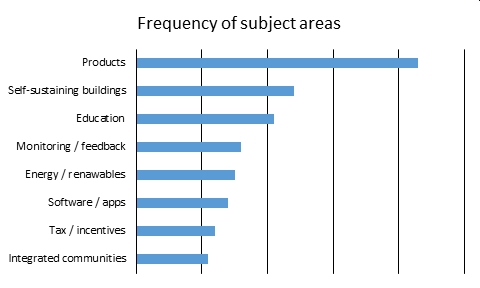Make buildings better winners
Radical proposal to prefabricate complex junctions rather than simple components wins BSRIA competition
On 20 April 2016, BSRIA and Designing Buildings Wiki launched the ‘Make Buildings Better’ competition, seeking ideas to improve the performance of buildings in use.
124 entries were received, proposing everything from networking groups of buildings to balance energy use, to running buildings on algae. The range of ideas submitted is illustrated below.
Despite the prevalence of innovative products among the entries, most participants didn’t actually think we need a raft of new solutions, but instead felt we should make better use of the ones we already have. Many existing buildings don’t even have double glazing or insulation.
Some of the most interesting ideas were about changing behaviour, with a general feeling that improvement will only come as a result of intervention, whether in the form of legislation, incentives, penalties, education or automatic controls.
The winning idea came from Tom Hughes, Director at architectural practice 2hD. Tom, who describes himself as an all-rounder, with a strong interest in technology, culture and community, has a PhD in the practice and theory of designing, building, and buying houses made of steel.

|
Tom proposed that build quality could be improved by prefabricating complex junctions, rather than prefabricating simple components as we do at the moment. These would be produced to length and delivered to site pre-insulated, air sealed and finished. On-site work would then just involve filling in the areas between the junctions with timber, steel or concrete as required. Find out more here |
Tom wrote, “This flips the current situation, in which the easy-to-produce components are made off site and the very difficult junctions are made on site, under less-than-ideal conditions. Our experience tells us that buildings leak air and let in water at the junctions, not in the middle of elements, so the quality control of factory production is being applied in just the wrong places.”
The runners up were:

|
Tamalee Basu, currently in the 4th year B.Arch programme in IIEST, Shibpur, India. She proposed that building management systems should progressively switch things off as design emissions limits are reached. Find out more here |

|
Jon-Scott Kohli studied environmental design at the University of British Columbia before moving to the UK. He is an associate at sports architecture and master planning practice Pattern Design. He proposed that buildings which emit carbon should be taxed, with the proceeds being paid out to buildings that are carbon negative. Find out more here |

|
Carl O'Connor works as a Building Design Engineer in Dublin and is about to undertake a Masters in Renewable Energy and Energy Management. He proposed the development of an app that gives a detailed breakdown of a buildings’ energy consumption, proposes ways of reducing energy use and allows remote control of devices. Find out more here |

|
Aris Kapsanakis is an engineer from Greece who lives in Hertfordshire and says “sometimes, I have some good ideas." He proposed that we make energy saving competitive at the community level - fantasy football style. Find out more here |
Gregor Harvie, Co-founder of Designing Buildings Wiki said, “It has been fascinating to see how radical many of the entries to the competition have been. People seem perfectly willing to contemplate the introduction of financial and behavioural pain and gain to force emission reductions through.”
Jayne Sunley, Knowledge Manager at BSRIA said, “We’re delighted with the variety and inventiveness of the entries submitted. Tom’s idea stood out as a genuinely practical and interesting way of tackling the performance deficit of buildings. So many problems occur at junctions, rather than within components themselves, it is an obvious place to focus attention”.
BIM Directory
[edit] Building Information Modelling (BIM)
[edit] Information Requirements
Employer's Information Requirements (EIR)
Organisational Information Requirements (OIR)
Asset Information Requirements (AIR)
[edit] Information Models
Project Information Model (PIM)
[edit] Collaborative Practices
Industry Foundation Classes (IFC)






